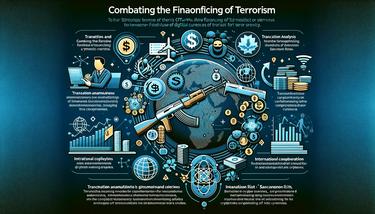CFT
Counter-Financing of Terrorism (CFT) obligations are integral to the regulatory frameworks designed to prevent and disrupt the financial support of terrorist activities. Crypto companies are required to implement measures that can detect and prevent the misuse of their platforms for the financing of terrorism. This document provides an overview of the CFT obligations applicable to crypto companies.
Key Facts
- CFT measures include monitoring and reporting suspicious transactions that could potentially support terrorist activities.
- Crypto companies must establish and maintain risk-based policies and procedures to identify risks related to money laundering[1] and terrorist financing.
- Compliance[2] with CFT obligations requires the implementation of internal controls, including employee training and audit mechanisms.
- Failure to comply with CFT requirements can result in significant legal and financial consequences for crypto companies.
Introduction to CFT in Crypto
The rise of cryptocurrencies[3] has introduced new challenges in combating the financing of terrorism. Crypto businesses are required to implement effective Counter-Financing of Terrorism (CFT) strategies to identify and mitigate the risks of their platforms being used for terrorist financing. This document outlines the key CFT practices within the crypto industry.Adhering to robust CFT measures is essential for ensuring the security of the financial system and complying with global regulatory standards.
Implementing Comprehensive Monitoring Systems
Effective CFT strategies involve the deployment of advanced monitoring systems capable of detecting suspicious transactions that may indicate the financing of terrorism. These systems analyze transaction patterns, flag high-risk activities, and monitor transactions linked to known terrorist entities.Automated tools and AI-driven analytics play a crucial role in enhancing the efficiency and effectiveness of monitoring efforts.
Adhering to Global CFT Standards
Compliance with international CFT standards, such as those established by the Financial Action Task Force (FATF), is mandatory for crypto businesses operating across borders. This includes implementing the FATF’s recommendations on virtual assets[4] and participating in information-sharing initiatives to combat terrorist financing.Regular updates to CFT policies and procedures ensure alignment with the latest global standards and regulatory requirements.
Collaboration with Law Enforcement and Regulatory Bodies
Crypto businesses must maintain open channels of communication with law enforcement and regulatory authorities to report suspicious activities and collaborate on CFT efforts. This cooperation is vital for tracing and disrupting the financial networks supporting terrorism.Building relationships with national and international security agencies enhances the collective ability to counteract terrorist financing.
Training and Awareness Programs
Educating employees about the risks of terrorist financing and the importance of CFT measures is critical. Regular training sessions equip staff with the knowledge to recognize and respond to potential threats, ensuring that all team members are committed to the company’s CFT objectives.Creating a culture of vigilance and compliance within the organization supports the effective implementation of CFT strategies.
Conclusion
Implementing stringent CFT strategies is imperative for crypto businesses to protect against the misuse of their platforms for terrorist financing. Through comprehensive monitoring, adherence to global standards, collaboration with authorities, and employee education, businesses can contribute to the global effort against terrorism.Staying proactive in enhancing CFT practices will remain a critical priority for the cryptocurrency[5] sector as it continues to evolve.
- Money Laundering — The process of making large amounts of money generated by a criminal activity appear to be legally obtained.
- Compliance — The act of adhering to legal standards and regulations established by governmental bodies and regulatory agencies, particularly in the context of financial operations and transactions involving cryptocurrencies.
- Cryptocurrencies — Digital or virtual currencies that use cryptography for security and operate on a decentralized system, unlike traditional currencies.
- Virtual Assets — Digital resources that have value in their use or as an investment, including cryptocurrencies and NFTs.
- Cryptocurrency — Digital or virtual currency secured by cryptography, facilitates secure, anonymous transactions.
- Financial Action Task Force (FATF). 'Guidance on Counter-Terrorist Financing Measures'.
- United Nations Security Council. 'Resolutions on Counter-Terrorism'.
- U.S. Department of the Treasury. 'Terrorist Financing and Financial Crimes'.


